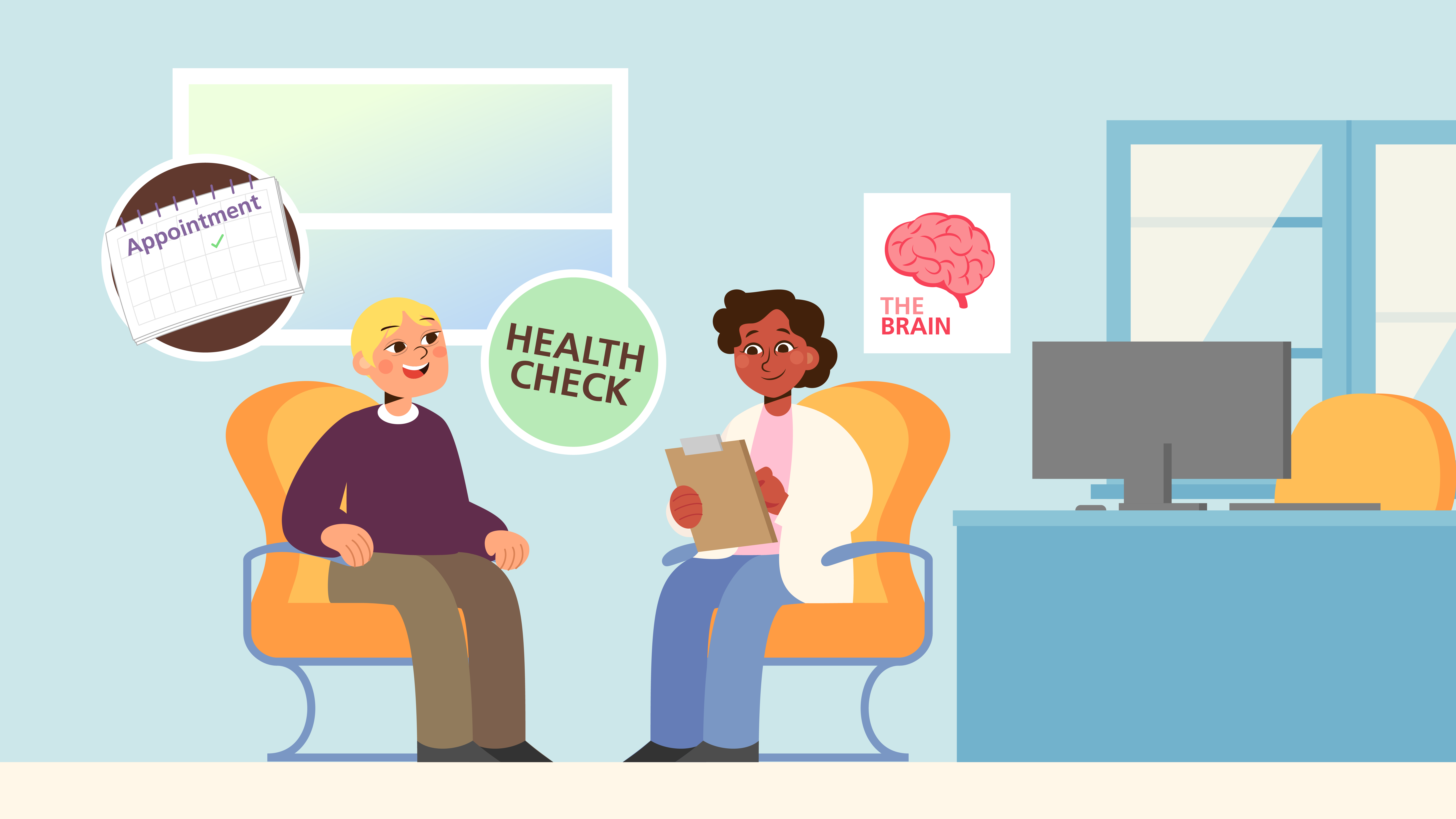Dementia prevention
What's good for the heart is good for the brain, reducing your risk of dementia whatever your age
Age and genetics play a significant role in dementia risk, however dementia is not an inevitable part of ageing — and it doesn’t only affect older people. Young Onset Dementia (symptoms before age 65) accounts for around 9% of cases, and up to 45% of all dementia cases may be preventable through healthy lifestyle choices.
That’s why we’ve developed a comprehensive, inclusive dementia prevention resource to support people at every life stage. Featuring animations and practical guidance, it offers tailored messaging for:
- Primary and secondary teachers & parents – nurturing brain-healthy habits from an early age
- College and university students – building knowledge and resilience for long-term wellbeing
- People with learning disabilities – receiving accessible, empowering information
- Adults in midlife – making lifestyle changes during key risk-reduction years
- People with mild cognitive impairment (MCI) – taking steps to protect and maintain brain health
- Health practitioners – enabling prevention conversations at every opportunity
Whether you’re thinking about your own brain health or supporting children, friends, or loved ones — this resource is designed to help you take action. Because prevention is about looking after each other, not just ourselves.
You’ll discover how everyday choices—being active, eating well, managing stress, sleeping better, engaging your mind, protecting your hearing, and managing cholesterol—can influence brain health. Starting early makes all the difference.
The resource aligns with the NHS England Well Pathway for Dementia and supports national prevention guidance, promoting equity, inclusion, and opportunity for all. It also features links to advice and local support services across Lincolnshire, helping people connect to what’s available in their community.
Alcohol consumption
Drinking too much alcohol increases your risk of developing dementia so it's important to check how much you're drinking by recording your units over the week. It is advised that you do not drink more than 14 units per week. If you do drink as much as 14 units per week, it is best to spread this evenly over 3 days or more to avoid binge drinking.
If you want to cut down, set yourself a limit for each time you drink (and keep to it). You could also try smaller glasses or drinks with lower alcohol content.
Alcohol-related brain damage (ARBD) is a brain disorder which is caused by a person regularly drinking too much alcohol or binge-drinking over several years. There are different types of ARBD. People who get ARBD are generally aged between about 40 and 50.
For more information about drinking alcohol, read advice on the Drinkaware website. For support in Lincolnshire, visit the Lincolnshire Recovery Partnership Drug & Alcohol Service website.
You can download a printable factsheet about this here.

Diabetes
Research shows that having type 2 diabetes increases a person’s risk of developing dementia (Alzheimer's disease and vascular dementia). Dementia risk also increases with the length of time someone has diabetes and how severe it is. In people with type 1 diabetes, severe blood sugar highs and lows are also associated with increased risk of developing dementia. However, it is important to note that diabetes is only a risk factor and does not mean that a person with diabetes will go on to develop dementia.
Sustained exercise in midlife and possibly later life, protects from dementia, perhaps through decreasing obesity, diabetes and cardiovascular risk. Keeping to a healthy weight and exercising will reduce your risk of type 2 diabetes, stroke and heart disease. Alcohol contains hidden calories, so you also need to be aware of how much you drink.
Read more about diabetes on the Diabetes UK website.
You can download a printable factsheet about this here.

Smoking
Long-term smokers lose on average 10 years of life, compared to those who have never smoked. Stopping smoking and keeping other risk factors under control will reduce the risk of dementia.
Smoking does a lot of harm to the circulation of blood around the body, particularly the blood vessels in the brain, as well as the heart and lungs. It can cause long-term negative effects on the body, including heart disease, cancer and diabetes.
It’s never too late to quit smoking, however the earlier you stop, the more brain damage you will avoid. Support is available to help you stop and you can read more about this on the NHS website.
You can download a printable factsheet about this here.
Social isolation
Social isolation is linked to an increased risk of developing dementia. It is thought that social contact helps with resilience against the effects of Alzheimer’s disease in the brain – known as cognitive reserve.
Research has found that social relationships, in both quantity and quality, affect mental health, health behaviour, physical health, and mortality risk. Adults who are more socially connected are often healthier and live longer than people who are more isolated.
As you get older, engaging in mental or social activities may help to build up your brain’s ability to cope with disease, relieve stress and improve your mood. This means that doing these activities may help to delay or even prevent dementia from developing.
Social activities may include joining social groups, attending social and learning sessions with the University of the Third Age (U3A), exercising at the local leisure centre, and volunteering. Your local branch of Age UK will also have information on local activities, in addition to support groups and activities on the H.A.Y. Lincolnshire website.
You can download a printable factsheet about this here.

Hearing loss
Hearing loss has long-term effects on health and it's believed to increase the risk for falls and depression. People with hearing loss have, over 10 years, a 47% increased risk of hospitalisation.
If you have hearing loss, you have a greater chance of developing dementia. Hearing loss can make the brain work harder because you have to strain to hear and may have to fill in the gaps. This means other thinking and memory systems can't function as well.
Many people start to lose their hearing as they get older, although they may not notice it at first.
It’s important to get your hearing tested. You may be able to book a free hearing test at your local optician or speak to your GP about being referred to an audiologist (a doctor for hearing).
You can download a printable factsheet about this here.

Uncorrected vision loss
Two in every 100 dementia cases have been linked to visual impairment in later life and more than one in 10 people over the age of 50 have uncorrected visual impairment.
Uncorrected vision loss covers lots of things, including not wearing glasses for short or long-sightedness over a very long period of time. Of particular note, research has identified an increase in dementia risk among people with two specific conditions that cause vision loss; untreated diabetic retinopathy and cataracts.
More research is needed to understand exactly why these increase risk, but these eye conditions are linked to inflammation and blood vessel damage, which contribute to diseases like Alzheimer’s.
Damage to our senses results in our brains receiving less stimulation and this can make us more vulnerable. It's important to visit the optician regularly to check for and treat any vision problems.
You can download a printable factsheet about this here.
Air pollution
Exposure to a high level of air pollution increases a person’s risk of developing dementia, in addition to being bad for your lungs. Key sources of air pollution include transport, domestic heating, agriculture, energy generation, and industry. This includes very small particles from traffic fumes and from burning wood in a fireplace.
The reason for the connection is not yet well understood but researchers do know that fine particulates can affect the lungs, circulate in the blood, and move into the brain where they might be able to cause direct damage.
We all have a responsibility to live and travel more sustainably to reduce air pollution in your local area. For example, you may choose to cycle instead of drive, or reduce your meat intake. Read more information on the Clear Air Lincolnshire website.
You can download a printable factsheet about this here.

Lack of physical activity
Physical activity is good for your heart, circulation, maintaining your weight, and mental wellbeing. Regular physical activity or even just moving more is one of the best things that you can do to reduce your risk of developing dementia. Studies have shown that regular exercise can reduce the risk of developing dementia by around 28%, with a potential 45% reduction for Alzheimer's disease.
Any exercise is better than none, whether it be a few walks per week, a low impact exercise class, or even a good weeding session in the garden.
You can download a printable factsheet about this here.

Traumatic brain injuries
Most Traumatic Brain Injuries (TBIs) are caused by falls, being struck by an object or by vehicle crashes, especially when a person is knocked on conscious. One of the most feared long-term consequences of TBIs is dementia. Certain types of TBI may increase the risk of developing dementia years after the injury takes place, so it’s important to look after your head.
Try to wear protective headgear in situations where there is a higher risk of head injury. For example, when riding a bike, working on a building site, horse-riding, or playing cricket.
Read more about brain injuries on the Headway (the brain injury association) website.
You can download a printable factsheet about this here.

High blood pressure
As you get older, you are more likely to develop certain health conditions, such as high blood pressure.
These conditions can increase the risk of getting dementia, including vascular dementia, which is the second most common form of dementia after Alzheimer’s disease. It is caused by reduced blood flow to the brain, which starves brain cells of the oxygen and nutrients they need to function correctly.
An important way to avoid this is by going for your free NHS Health Check. Your GP may invite you to one, or you can book an appointment by contacting them.
Midlife systolic blood pressure should be 130 mm Hg or lower to delay or prevent dementia. Visit Blood Pressure UK’s website for more information about how to measure your blood pressure.
You can download a printable factsheet about this here.

High cholesterol
High cholesterol is a common, treatable condition that increases the risk of several other serious conditions. Cholesterol is a type of fat that’s found in the blood, with most of it being produced by our livers. There are different types of cholesterol, some bad, and some good.
The term ‘high cholesterol’ is used when there is too much LDL cholesterol or total cholesterol in your blood.
Lots of different factors can contribute to having high cholesterol. These include:
- eating too much fatty food
- not doing enough physical activity
- being overweight
- smoking
- drinking alcohol
It can also run in families, so you’re at higher risk if you have a parent or sibling with high cholesterol. High cholesterol is symptomless, so having it checked regularly from midlife is a good idea.
HDL, often called good cholesterol, carries excess cholesterol away from our blood and cells, back to the liver where it is broken down.
LDL is known as bad cholesterol and too much of this clogs our blood vessels and leads to serious health problems such as stroke, heart disease and dementia. Having high levels of LDL cholesterol in our 40s, 50s and 60s is associated with an increased risk of dementia.
You can download a printable factsheet about this here.
Obesity and poor diet
The increased risk of dementia from obesity could be because of its link to diabetes, high blood pressure and inflammation.
A healthy and balanced diet may reduce your risk of dementia, as well as other conditions including cancer, type 2 diabetes, obesity, stroke and heart disease.
A healthy balanced diet includes lots of fruit and vegetables. Fats should be mainly unsaturated (such as olive oil) with very little saturated fat (such as cakes, biscuits, butter, and most cheeses). A Mediterranean diet also has some fish, poultry, eggs and dairy, but only a small amount of red or processed meat.
To eat healthily, limit sugary treats such as fizzy drinks and sweets and keep an eye on your salt intake, especially salt hidden in bread, pizza and ready meals.
It's also really important to drink plenty of water throughout the day, especially in the morning when you are most dehydrated from sleeping.
You can download a printable factsheet about this here.

Depression
Most people feel low or sad from time to time but this is not the same as being depressed. Depression is a condition that can last for several weeks, months or years.
Depression might be a risk for dementia, but in later life dementia might cause depression.
At least one in five people in the UK will have depression at some time in their lives. It is is often diagnosed when a person is in the early stages of dementia, however, it can develop at any stage. Depression can also come and go throughout a person's life.
If you often feel low, anxious or irritable, talk to your GP or read about NHS mental health services in Lincolnshire via Lincolnshire Partnership NHS Foundation Trust as soon as possible.
Sleep is very important for your mental wellbeing and getting good sleep may reduce your risk of dementia. A good night’s sleep for many people is around seven to eight hours. If you have any problems sleeping well, particularly sleep apnoea, speak to your GP about getting support.
You can download a printable factsheet about this here.

Lack of education
Studies on dementia consistency show that the more time you spend in education, the lower your risk of dementia.
Research published in 2020 by The Lancet Commission examined dementia interventions and found 7% of worldwide dementia cases could be prevented by increasing early-life education. The study found that higher childhood education levels and higher lifelong educational attainment could reduce dementia risk. Exactly how education helps is a mystery, but researchers have several theories.
If you can keep your mind stimulated, you are likely to reduce your risk of dementia. Regular mental activity throughout a person's lifetime seems to increase the brain's ability. This helps build up a 'cognitive reserve' and allows the brain to cope better with disease.
You can download a printable factsheet about this here.

Join dementia research
Did you know - you can help advance dementia care, diagnosis, and treatments?
When you sign up to Join Dementia Research, the information you provide is used to match you to studies you may be able to take part in online, nationally and in your local area.
Research offers hope. Only through research can we understand what causes dementia diseases, develop effective treatments and improve the care of those living with dementia. We need more people with and without dementia to take part in vital studies.
Videos
Introduction to dementia prevention

Primary age teachers and parents

Secondary age, parents and teachers

College and University students

Midlife - 40-65 years

Health practitioners

People with learning disabilities



